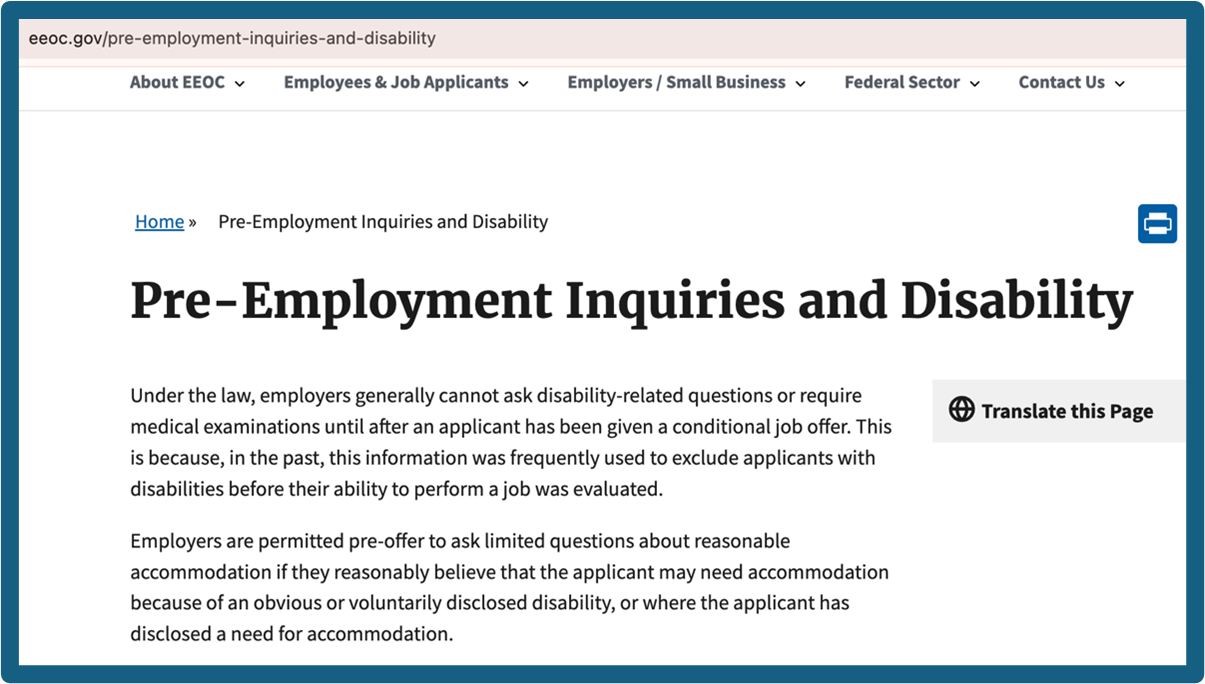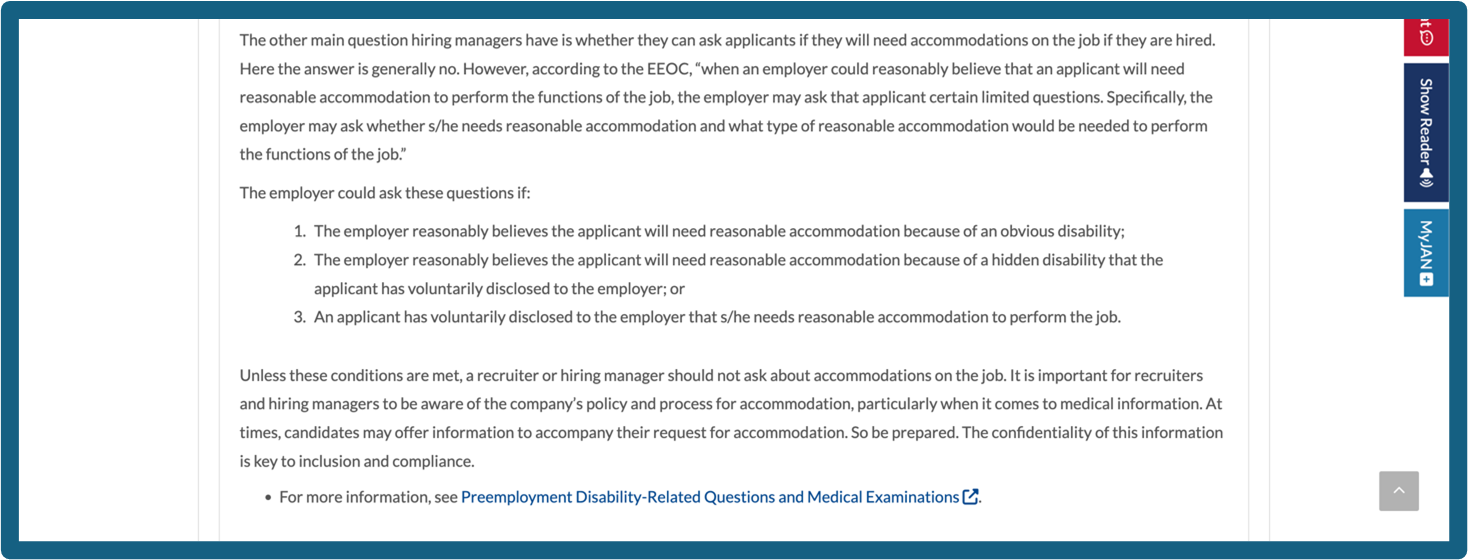Submission Date:
Question:
If a prospective employer specifically asks about a candidate’s physical capacity to do a job and they say they can do all of the tasks required, and then notify us afterwards that they need accommodations for things they said they could do without them, are we:
a) by law required to provide them
OR
b) can we make a decision that the person is not able to do the essential functions of the job and therefore not be allowed to continue in their employment?
Dishonesty in applying for jobs seems grounds for termination, but when it comes to disabilities, I realize it’s a minefield.
Answer:
A minefield, indeed.[1]
The first issue in this question is the premise: “If a prospective employer specifically asks about a candidate’s physical capacity to do a job and they say they can do all of the tasks required…”
When interviewing a job applicant, it is perfectly appropriate to ask if they are able to perform the essential functions of the job. Acceptable questions are:
- Can you type 90 words per minute?
- Can you weld for an 8-hour workday?
- Can you read out loud to kids for an hour at a time, even if they interrupt you because they need to use the bathroom?
However, it is important to remember that the answer can honestly be “yes,” whether or not an accommodation is required to be able to perform the task.
In other words, the answer can honestly be “yes”, even if:
- The typist needs a special keyboard due to carpal tunnel syndrome;
- The welder needs a special back brace;
- The reader needs a hearing aid, so they can hear questions from the attendees.
Of course, in the scenario sent in by the member, things are not that simple, since the applicant’s honesty is being questioned (“… they need accommodations for things they said they could do without…”).
Before addressing possible dishonesty, a critical consideration is: how did the applicant happen to say they didn’t need an accommodation? Did the applicant simply say that they can do the tasks (which as we reviewed above is fine, even if they now need an accommodation), or did the employer ask if the applicant needed an accommodation?
If the employer specifically asked, that is where we enter the minefield[2], because there are very limited circumstances where an employer can ask if accommodations are needed.
Because this is so high-risk, I am simply going to put a screenshot of the Equal Employment Opportunity Commission’s (EEOC) guidance here:

The “Job Accommodation Network,” at AskJAN.org, provides additional guidance on this limited ability to ask applicants about the need for accommodations:

Why are these excerpts from the EEOC and AskJAN relevant? The only way the issue of accommodations could have been brought up by the employer is if the applicant had an “obvious” disability (two legs in a cast), or the applicant voluntarily disclosed a disability before/during the interview.
After that, if the employee was flat-out dishonest, that is indeed a grave concern.
That said, it is important to remember that disability is not static. A person may need mobility assistance one day and not need it another. A person may be able to hear in certain circumstances and not in others. A person may have low-pain days and high-pain days where they are more easily fatigued. The point of the Americans with Disabilities Act[3] and the New York State Human Rights Law[4] is that people get to work so long as an accommodation can enable them to perform from day-to-day.
The final part of the question is: if the need for an accommodation was not disclosed during the interview, is the employer now “by law required to provide them?”
If the requested accommodation is “reasonable” (which changes from employer to employer[5]), the employer is required to provide the accommodation. This is true even if the employer also has to address the impact of documented dishonesty during a job interview.
This is because dishonesty during a job interview and requesting a disability accommodation occupy two separate legal buckets.
Bucket 1: Dishonesty during a job interview
Dishonesty during an interview would not bar an employee from later getting an accommodation they are entitled to, but it could be a reason to terminate employment. It must be evaluated using the employer’s policy on employee honesty and corrective action.
Bucket 2: A request for disability accommodation
A request for a disability accommodation (even after previously saying one is not needed), simply needs to be addressed as a request for an accommodation. It must be evaluated using the employer’s disability accommodation policy.
The final take-away: if an employer is facing a situation like this scenario, and especially if they were to consider termination the basis of applicant dishonesty, it is wise to work with an HR professional or lawyer to address the situation. That process would start with determining if there was an improper inquiry during the interview, and if there was, if any dishonesty was serious enough to merit a warning or termination.
While that evaluation was pending, accommodations should be provided if they are reasonable.
Thank you for any important question.
[1]I have recently been trying to get away from war metaphors when discussing law. Sports and the arts are helping; “battle plan” is now “playbook,” and “crush your enemies” is sometimes “out-sing the competition.” But since the law is adversarial, it’s a tough fight ongoing rehearsal.
[2] The croquet lawn? The Eugene O’Neill play? “Minefield” is a tough one to replace with a sports or arts analogy.
[3] The ADA applies to employers with over 15 employees and to all government employers.
[4] The Human Rights Law, which bars employment discrimination on the basis of disability, applies to all employers in New York State, regardless of size, and applies much the same approach as the ADA. So, it is wise for all employers in New York to abide by the ADA when addressing accommodation requests by employees.
[5] A good flow chart for assessing accommodation requests during interviews is here: https://askjan.org/articles/Hiring-Process-Reasonable-Accommodation-Flowchart.cfm. A good place to start for assessing employee requests is here: https://askjan.org/toolkit/index.cfm.
Tag:
ADA, Disability, Civil Rights, Public Libraries, Association Libraries, Employee Matters
